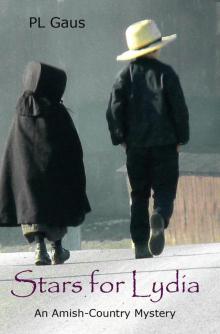- Home
- P. L. Gaus
Whiskers of the Lion Page 19
Whiskers of the Lion Read online
Page 19
But Armbruster could neither reach it nor grasp it. It had been only a resonance lodged in a vanishing dreamscape. It had been an audible warning without the clarity of specificity. An echo from memories he could not identify.
Armbruster finished his coffee and clipped his holster to his belt. He went out into the steamy August morning, locked his trailer home’s door, and drove down the farmer’s lane. It was a long gravel drive, potted with muddy holes. He rolled down the windows and heard the tires of his red Corolla splashing murky water to the sides as he advanced.
The hiss of the splashing called to Armbruster’s mind the gravel drive at the Helmuth farm. That drive had been puddled, too. He remembered the rain that had fallen the morning when he had discovered Dent’s body. That had been only two days ago—the day he had called in his location in the rain, sitting in a mud puddle beside his Corolla. “The day,” Armbruster muttered. The day that his new career as a Holmes County detective had skipped abruptly and irrevocably sideways. The day that his hopes of impressing Pat Lance had been dashed.
Armbruster stopped at the edge of the blacktop in the dark, and he anxiously considered the turn onto the county road toward Holmesville. His fingers clenched the steering wheel while his thumbs drummed against it. What had he overlooked yesterday? Why did it seem so important? Did he still have a chance with Lance?
Nervous with vague unease, Armbruster glanced left, then right. He studied the floodlight in his rearview mirror. His trailer sat two hundred yards behind him, at the end of the farmer’s lane. It was parked in a glade beside the beagle run. Beside the hutches where he kept the farmer’s rabbit dogs.
“Beagles,” Armbruster groaned. He cranked his steering wheel and backed around on the lane. He drove slowly back toward his home. He had forgotten to tend to the dogs, and the urgent concerns of his dream were dissipated by the needful practicality of feeding the beagles.
• • •
Fannie Helmuth awoke in her hotel bed and lay for a moment with her eyes closed, thinking about last night’s phone call from Jodie. Still troubled by the call, Fannie opened her eyes slowly, rolled onto her side, and saw that Caroline’s bed was empty beside her. Slowly, Fannie became aware of water running in the shower, behind the closed door to the bathroom.
Had Caroline guessed last night who had called? Certainly she had been curious to know who it was. Was it a good sign that Caroline had not asked about the call? Perhaps. It did reveal her restraint. Did it also reveal her trustworthiness?
Jodie had always been so certain that nobody could ever know that they talked to each other on their phones. Jodie had been on the run, too—in hiding, just as she and Howie had been—and Jodie had always cautioned her not to tell anyone. Not to tell even Howie. They could talk, Jodie had said, but they could never tell. They could never meet. Jodie had said this from the very beginning, when Fannie had called her in April, on the new phone that she and Howie had bought at the Walmart in Memphis. “Fannie,” Jodie had cautioned her, “we can never try to see each other.”
Quickly though, Howie had guessed who it was that Fannie was calling. And who it was that was calling Fannie back. Howie had known almost from the start that it was Jodie. He had known about the calls, and he had advised her not to continue. He had always suspected that Jodie was just as much an enemy as Teresa Molina was.
Still, hadn’t Jodie said herself that Fannie should never tell her where she was? And Jodie in turn would never tell Fannie where she was. Their safety depended on this. That’s what Jodie had always told her when they had started calling each other. It was to be a sign of trust that Jodie would never ask where she and Howie were.
And she hadn’t asked. Jodie hadn’t wanted to know. Through all of their weeks in hiding, Jodie had never wanted to know where they were. Until last night.
Last night, that had changed for each of them. Jodie knew that Howie had been murdered. And Fannie knew that Teresa Molina was threatening the life of Jodie’s mother. Certainly these things changed everything. For Jodie and for Fannie. Now Jodie did want to see her. She had said that she urgently needed Fannie’s help. Beyond the five thousand dollars, she was asking for the very thing she had promised she would never ask. She was asking, she had said, because of Teresa Molina’s threat.
The bathroom door opened, and light and steam emptied into the bedroom. Caroline came out wrapped in a white bath towel. With a hand towel, she was drying her long auburn hair.
Fannie sat up in bed and said, “You were in Sarasota?”
Caroline spun the length of her auburn hair between the ends of her hand towel and answered, “Yes. We were there in April.”
“Were you there because of me?”
“Partly,” Caroline said. “We were there on vacation, and Bruce Robertson asked us to interview Jodie Tapp. Ruth Zook had been murdered. He knew Ruth had worked at the same restaurant where you and Jodie did. In Pinecraft.”
“That’s where I met her,” Fannie whispered.
“Fannie,” Caroline said, “how did you know I was in Sarasota? I never told you that.”
“I have a friend who calls me,” Fannie said. “Are you done in the shower?”
Caroline sat on the bed to face Fannie. She held her hand towel idle in her lap. “Is this the same person who called you last night? The one who called yesterday at the Mast farm?”
“Yes.”
“Because, well, you went into the bathroom to talk last night. You didn’t want me to listen.”
Fannie pulled her covers off and stood up beside her bed. She walked into the bathroom, saying, “It was just a friend.”
• • •
In room 7, on the third floor of the Hotel St. James in Millersburg, Bruce Robertson watched the red numerals of the digital alarm clock blink from 5:44 to 5:45. He was seated in a corner chair with the lights off. He had spent the night in the room, sometimes sitting in the dark, sometimes pacing with his thoughts. He had tried to rest at first, but he had found that impossible. Long after Pat Lance had closed her door and fallen silent in room 6 next door, Robertson had settled into the corner chair to watch the clock and to think.
The shades of the sheriff’s Jackson Street window were tightly drawn. At no time had he turned on the lights in his room. When Lance and the professor had registered for their rooms, Robertson had already secured the key card for room 7 without putting it on record that he had taken the room for the night. In this he had secured the hotel management’s cooperation. No calls would be put through to his room’s phone. No deliveries would be made. None of the maids would knock on his door. He would leave and reenter, if he needed to, through the door to Lance’s room, number 6.
Robertson rose in the dark and entered his bathroom by the dim glow from a nightlight he had installed near the floor. He ran cold water onto a washcloth and rubbed stiffness from his face. He rewetted the washcloth and brushed it several times back and forth over his bristly gray hair. He fingered the whiskers on his chin and took out his razor to shave. When he had finished, he came out and dressed without turning on the lights.
Lance would be waking, he thought. She’s probably grumbling about the Amish clothes she’ll have to wear today.
The professor will be up soon. If he managed to get any sleep. He had brought a small bag from home, but he, too, faced a day in Amish attire.
Once he had dressed, Robertson put his wallet in his hip pocket and swiped his keys from the dresser. The keys slipped from his grasp, and they clinked against each other when they landed on the carpet. He bent over to pick them up, and he gave them a shake. Again, they clinked against each other. They made a tiny cluster of notes, hanging from their ring on his index finger. He shook them again, and he found his thoughts roaming anxiously over the evidence that he had.
It wasn’t much. There was the yellow car. And the red backpack.
28
Friday, August 19
>
7:15 A.M.
CAROLINE FINISHED dressing while Fannie was still in the shower. She had only the clothes she had been wearing the day before, so when she emerged from the bedroom, she appeared to be a traditional Mennonite woman in a turquoise dress and a white lace head covering. She closed the bedroom door and turned to the two agents seated around the middle room’s coffee table. She was about to explain her intentions to go shopping for clothes and toiletries when there was a knock at the door to the suite. One of the two agents rose and went to the door, and when he opened it, there stood Wanda Mast with a male supervisor. Wanda held a stack of folded women’s clothing, and she started to enter the suite. As she did so, the second of the two agents rose at the coffee table and came forward asking, “What is that, please?”
“Clean clothes for Fannie Helmuth,” Wanda said, stopping in the doorway. “She requested clean clothes yesterday.”
“I’ll need to see them,” the agent said, and he took the clothes from Wanda.
Wanda attempted to enter farther into the suite with her supervisor close behind, but the first of the two agents remained at the door to bar their access. “Please wait there,” he said, and he planted himself in front of the doorway.
Wanda spoke up as the second agent spread the Amish clothes across the surface of the kitchen’s dining table. “It’s just clothes. Fannie requested clean clothes.”
On the dining table, the agent had spread out a long forest-green Amish dress that was identical in style to the blue one that Wanda was wearing. Beside it, there was a blue dress in the same shade and fabric as Wanda’s. There was also a plain white day apron that matched Wanda’s. There were undergarments and a pair of black hose. Finally, there was a pair of black cotton socks in a woman’s size.
The agent refolded the clothes and carried the stack back to the doorway. He handed them to Wanda and said, “They’re just like yours.”
“They are Amish clothes,” Wanda said. “Forest green is a popular color right now, and so is this blue. But our styles are all meant to be the same.”
Caroline came forward to the doorway and took the clothes from Wanda. “Fannie’s in the shower,” she said. “I’ll lay these out on her bed.”
“I should have some more for her, tomorrow,” Wanda said. “Today I just grabbed what was in my closet.”
Caroline opened the bedroom door, carried the clothes inside, and came back out to find Wanda and her supervisor, who were still standing at the suite’s door. “Fannie’s in the shower,” Caroline said again, and she gently closed the bedroom door. “I’ll walk down with you, Wanda. I was just going out shopping.”
As the two women turned down the hall, the Amish supervisor lingered at the suite’s door to ask, “When may we make up the room?”
The agent who had remained at the door said, “Our two partners are down at breakfast, so our second bedroom is empty right now.”
“Now, then,” the supervisor confirmed. “I’ll get a team and bring them up.”
“They’ll have to be checked,” the agent said. “And we’ll have to search their cart.”
“Of course,” the supervisor replied as he turned to follow Wanda and Caroline down the hall. “You may search anything you like.”
Caroline rode down in the service elevator with Wanda Mast and her supervisor. On the way, the elevator made a stop on the second floor, and two maids in forest-green dresses pushed their service cart onto the elevator to ride down. When the elevator reached the lower vestibule, the two maids pushed their cart off and turned for the laundry. Another team of maids was waiting in the vestibule to take the elevator back up. They, too, were in plain forest-green dresses with white aprons, soft black shoes, and white organdy Kapps.
Caroline, Wanda, and the supervisor stepped off the elevator, and the new team of maids rolled their cart onto the elevator. As the elevator doors closed in the vestibule, Caroline eyed Wanda suspiciously and asked, “Is forest green the color of the day, Wanda? Or did everybody just choose that color on their own?”
Wanda fingered the sleeve of her blue dress and said, “Forest green seems to be a popular color today, Mrs. Branden. I just happened to choose blue.”
From the laundry room beside the elevator doors, another pair of maids in forest-green dresses emerged. One of them pushed the elevator button, and they both stood silently in front of the elevator doors to wait.
Caroline studied the dresses in front of her. Not only were they the same in color, they were also the same in style. The dresses were identical in the way they were hemmed and pleated. They were identical in the gathering at the shoulders, and in the length of the sleeves. The aprons were also identical in the front waist panel, the bodice, and the wrap over the shoulders. Caroline thought, remembered, understood, and smiled. The clothes that had been delivered to Fannie would be the same, she realized.
“I was going out shopping,” Caroline said circumspectly to Wanda. “How long do you think I should take?”
Wanda returned Caroline’s smile. “I should think a couple of hours would suffice,” she answered.
The elevator doors opened. The two maids who had called the elevator stepped inside, and one of them held the doors open for Wanda and her supervisor.
Once the four Amish people were inside the elevator, Wanda said to Caroline as the doors closed, “It was nice meeting you, Mrs. Branden. Give our regards to the sheriff.”
• • •
With the cart parked in the hall outside Fannie’s suite 416, one of three maids in forest-green dresses knocked on the suite’s door. She called out, “Room Service,” and stepped back from the door, to stand with her partners.
The eyehole in the door darkened momentarily, and then an agent of the FBI’s maintenance team opened the suite’s door. He held an electronic wand. He stepped into the hall and closed the door behind him. Holding up his wand, he said, “I need to wand each of you, so please stand a little bit more apart. I will not touch you with the wand, but I do need to pass it over the entire length of you, front, back, and each side.”
The maids stood still while they were wanded, and then the agent said, “Please step back while I check your cart.”
The three women stepped to the side, and the agent sorted through the clean towels and linens. Next he opened several of the small bottles of shampoo and mouth wash to smell each of them. When he had finished his inspection, he said, “One moment,” and he knocked on the suite’s door.
Again the eyehole in the door darkened, and a man on the inside asked, “How many are there?”
“Three,” he was answered. “They’re cleared.”
The suite’s door opened, and the second of the two agents held the door to admit the maids. Two of the three maids carried stacks of clean towels, and as they entered, the agent stepped aside and said, “Please start in the bedroom on the right.”
The two maids with towels turned right and started their work in the bathroom of the bedroom. The third maid went to the kitchen at the back of the suite’s center room, and there she began to stack and wash dishes.
From the right bedroom, one maid carried out a bundle of wet towels and washcloths. She went to her cart in the hallway, dumped the wet towels in the cart’s basket, and took up a stack of clean sheets and pillowcases. These she carried into the bedroom on the right.
When the maid in the kitchen had finished some of the dishes, she came forward to the bedroom on the right, to take a bundle of dirty sheets from one of the maids there. These she carried out to the basket on the cart. When she came back in, she carried bottles of shampoo and conditioner, plus a box of tissues. She took these into the bedroom on the right, and as she did so, one of the two maids who had started in the bedroom came out to work in the kitchen, to finish washing dishes.
Once this much of the work was finished, the kitchen maid stepped out into the hallway, where she remained
. Spaced by an interval of about a minute, the two maids from the bedroom on the right emerged singly from the bedroom. The first of them walked back to the kitchen to dry dishes, and the other went out to the cart. When they reentered the suite, one maid carried towels and washcloths, and the other maid carried a stack of folded sheets and pillowcases. They entered the bedroom on the left.
After a while, a maid in a forest-green dress stepped out of the bedroom on the left carrying a tall bundle of sheets and pillowcases. She took them out to the cart and stepped aside. The maid who remained in the bedroom on the left turned on the television there, switched to a cartoon channel, and turned up the volume on a Tweety Bird cartoon. The sound played out into the suite’s middle room.
Next, the maid in the kitchen finished drying the dishes and putting them up in the cabinets. She came forward from the kitchen and entered Fannie’s bedroom on the left side of the suite. From there, a maid in a forest-green dress emerged with two small plastic liners from the wastebaskets in the bedroom. She took them out to her cart to toss them into a larger trash bag stretched across the push handles of the cart. There she waited alone for her partners to finish in the bedroom on the left.
When the last two maids came out to the center room, one of them said to the agents, “We have finished.” She said this as she closed the door to Fannie’s bedroom.
One of the two agents seated at the coffee table rose and carried a coffee cup into the kitchen. As he did so, a maid asked, “Can I wash that for you?”
The agent shook his head and said, “Thanks, but no.”
The sound of the TV was plainly audible through the closed door of Fannie’s bedroom. Tweety Bird was chirping in high form about a puddy tat, and thumping sounds accompanied the bird’s antics.
The second agent rose from the sofa at the coffee table and asked the maids, “Is she watching TV?”
One of the maids shrugged. “We had no idea she liked the Tweety so much.”

 Stars for Lydia
Stars for Lydia Cast a Blue Shadow
Cast a Blue Shadow Separate from the World
Separate from the World Clouds without Rain
Clouds without Rain Blood of the Prodigal
Blood of the Prodigal Whiskers of the Lion
Whiskers of the Lion A Prayer for the Night
A Prayer for the Night Broken English
Broken English Harmless as Doves: An Amish-Country Mystery
Harmless as Doves: An Amish-Country Mystery